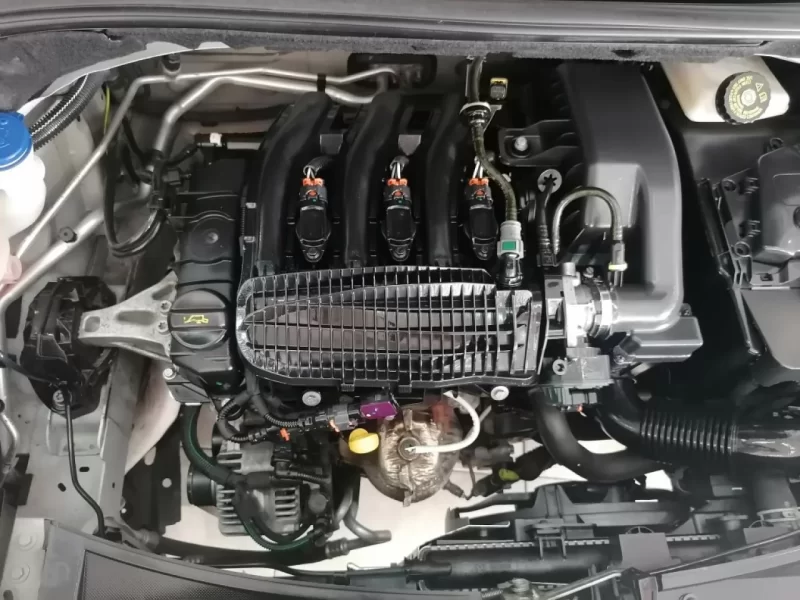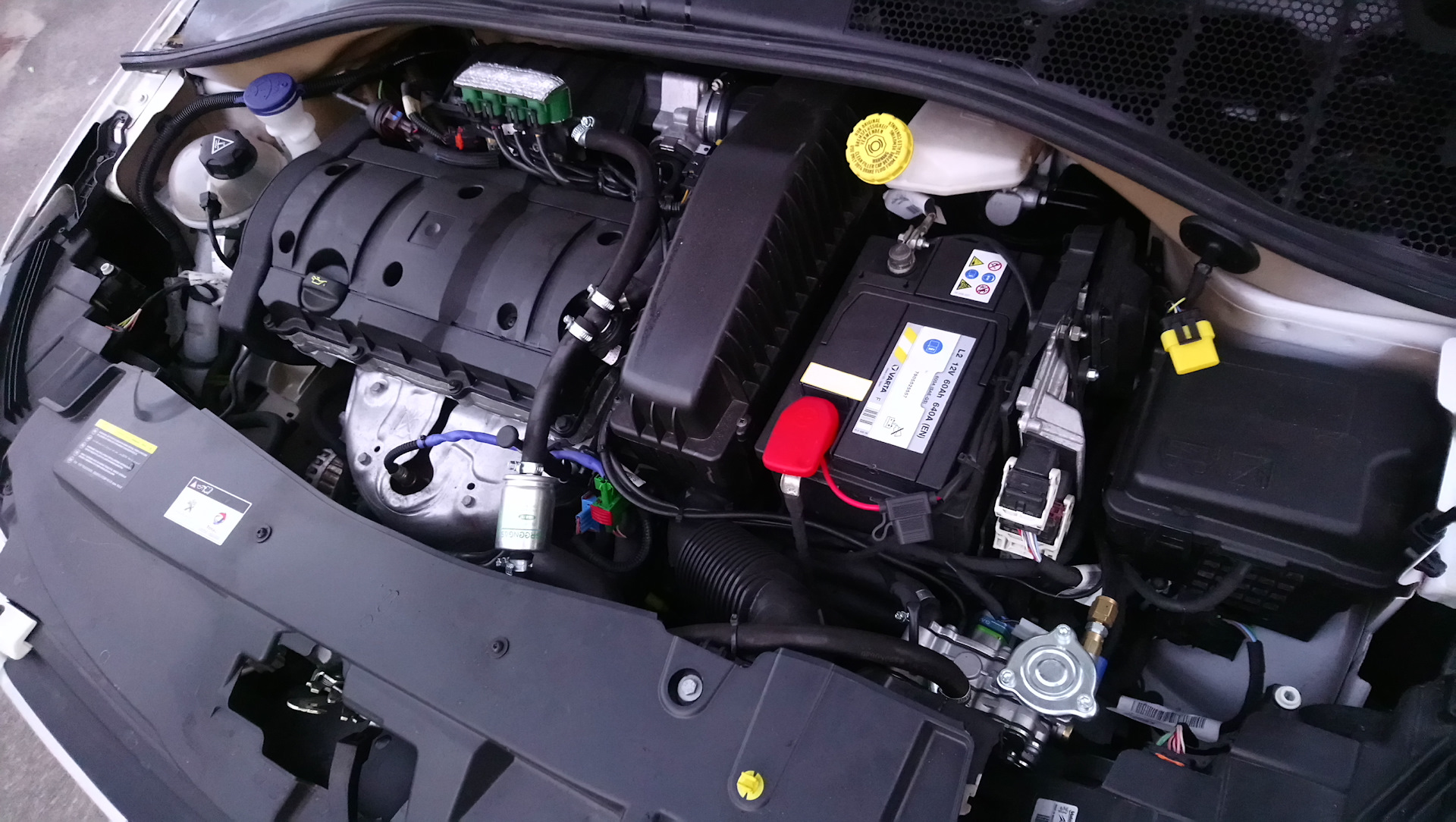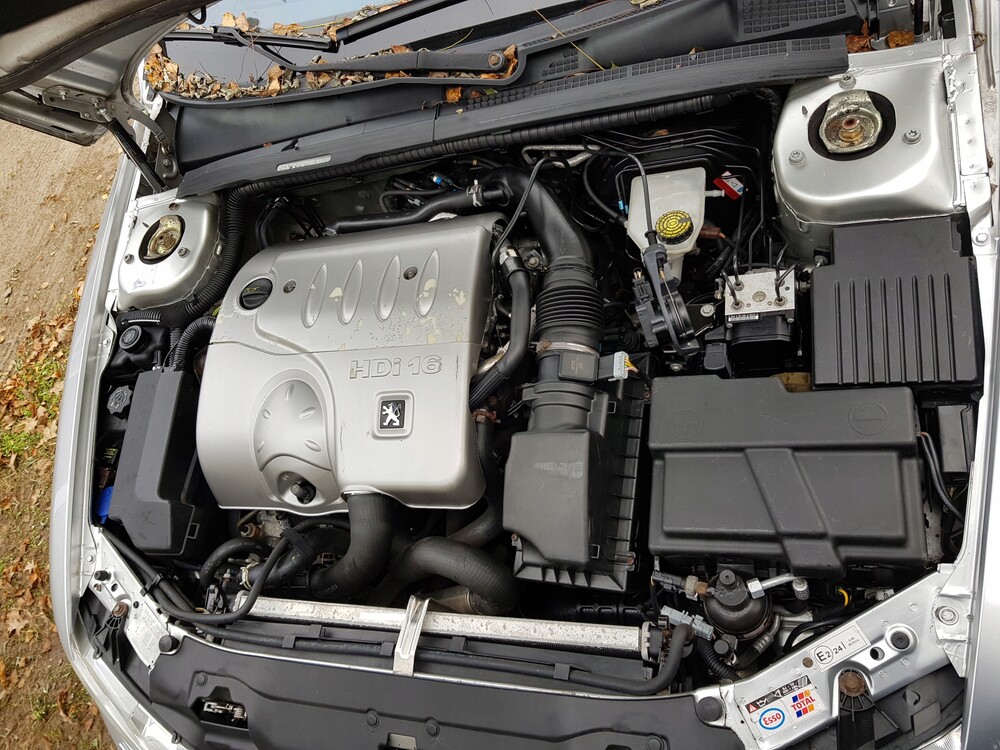The 1.0-liter 3-cylinder Peugeot EB0 or ZMZ engine was produced from 2012 to 2017 and was installed in the base versions of the 208 model and the similar Citroen C3 of the second generation. The modification of such a power unit under the stricter Euro 6 economy standards has the index EB0F.
The EB range also includes EB2, EB2M, EB2DT, EB2DTS and EB2ADTX.
Motor specifications Peugeot EB0 1.0 VTi
| Determined displacement | 999 cm³ |
| Power system | distributed injection |
| Drive power | 68 hp |
| Torque | 95 Nm |
| Cylinder block | aluminum R3 |
| Cylinder head | aluminum 12v |
| Cylinder diameter | 71 mm |
| Piston stroke | 84.1 mm |
| Compression ratio | 10.5 |
| Dvs features | no |
| Hydrocompensators | no |
| Transmission timing | belt |
| Fasor regulator | dual VTi |
| Turbocharger | no |
| What oil to use | 3.25 liters 0W-30 |
| Fuel type | AI-92 gasoline |
| Ecological class | Euro 5 |
| Example service life | 250,000 km |
EB0 engine catalog dry weight is 70 kg
Problems
Elevated oil consumption
One of the typical problems with the Citroën/Peugeot EB0 engine is increased oil consumption. This can be due to worn piston rings or malfunctions in the crankcase ventilation system. In such cases it is necessary to check the condition of the piston group as well as the ventilation system. In some cases, the piston rings or other system components need to be replaced.
Noise and Vibrations
This engine is subject to increased vibration and noise, especially at idle or on startup. This is due to the engine’s three-cylinder configuration, which by nature is more prone to vibrations. Often the cause of these problems is worn engine mounts. The solution may be to check the condition of the engine mounts and replace worn pads.
Irregular idling
Sometimes owners experience erratic engine idling. In such cases, the cause may be a clogged fuel system, problems with the mass airflow sensor or worn spark plugs. To fix the problem, we recommend cleaning the sensor, checking the fuel system and replacing the plugs if necessary.
Turbocharger problems (if turbo is installed)
For turbocharged versions of the engine, problems with delayed response and loss of power can occur. This is often caused by turbine contamination or problems with the turbine control system. Checking the condition of the turbo hoses, pressure control valves, and intercooler may solve the problem.
Coolant leaks
Sometimes, the EB0 engine may experience antifreeze leaks, causing it to overheat. This can happen due to leaks in the cooling system connections, especially around the water pump or thermostat. In such cases, the cooling system should be checked and, if necessary, the damaged components should be replaced.
Exhaust Gas Recirculation (EGR) clogging

The EGR system, which is used to reduce emissions, can sometimes become clogged. This results in reduced engine power, increased fuel consumption, and diagnostic errors. Cleaning the EGR system or replacing its components can help restore normal engine operation.
Transmission timing chain problems
Engine starting noise or malfunctions can be caused by a stretched timing chain (timing chain). A stretched chain can interfere with the synchronization of the valves and pistons, affecting engine performance. In this case, the chain and tensioner must be replaced.
Program errors (ECU)
Sometimes the EB0 engine can suffer from Engine Control Unit (ECU) software errors. This manifests itself in constant errors on the dashboard and unstable engine operation. In such a case, an ECU firmware update by an authorized dealer is recommended.
Injector clogging
Due to contamination of injectors, there may be uneven engine operation and deterioration of acceleration dynamics. The problem can be solved by cleaning the injectors or replacing them if they are severely clogged.
Recall campaigns
The Citroën/Peugeot EB0 (EB0 PureTech) engine has been involved in several recall campaigns related to certain problems that could affect the safety or reliability of the vehicle. Here are a few of the major recall campaigns related to this engine:
1. Timing chain problems
One of the main causes of recalls for EB0 series engines has to do with the timing chain (timing chain). In some cases, the timing chain may have stretched faster than expected, which could cause engine malfunctions and even engine failure. As part of the recall, the chain and tensioner were replaced with new, reinforced versions.
2. Fuel system problems
There were cases when the fuel injectors on the EB0 engine did not work properly, which could lead to reduced engine power, rough running and increased fuel consumption. In such situations, the manufacturer launched recall campaigns to replace the injectors and check the fuel system.
3. Antifreeze leaks
Some models equipped with the EB0 engine had problems with the cooling system, specifically the water pump or radiator. These problems could cause coolant leaks and engine overheating. As part of the recall campaigns, the problematic cooling system components were replaced.
4. EGR system malfunctions
Problems with the exhaust gas recirculation (EGR) system have also been the cause of recalls. In some cases, the system could become clogged, resulting in reduced engine power and increased emissions. As part of the campaign, the system was cleaned or replaced.
5. Software problems
Some vehicles equipped with the EB0 engine had software problems with the engine control unit (ECU). Errors in this unit could cause a variety of malfunctions, including improper fuel and ignition control. Manufacturers have been updating the ECU firmware as part of recall campaigns.
6. Problems with the turbocharger system
Turbocharged versions of the EB0 engine have recorded instances of the turbine control system malfunctioning, which can lead to loss of power and erratic operation. In such cases, recalls were conducted to replace turbocharger components or control systems.



0 Comments